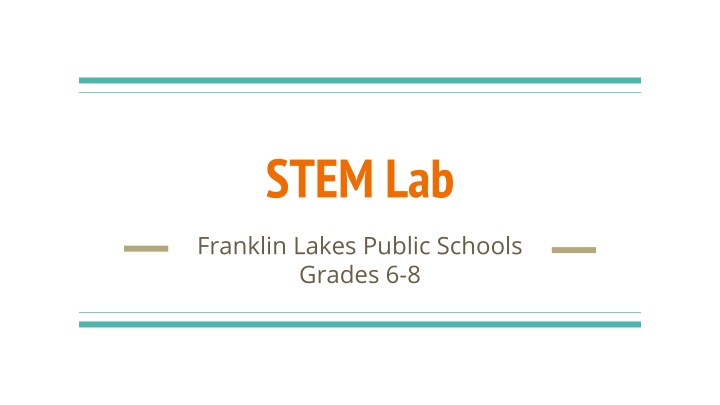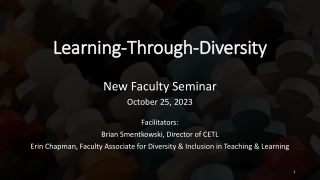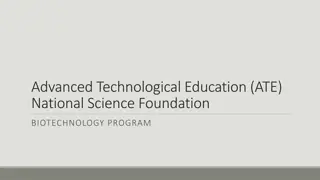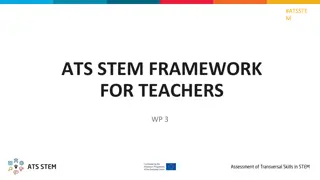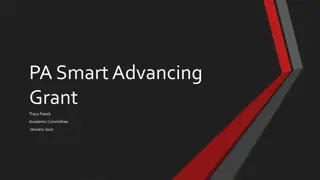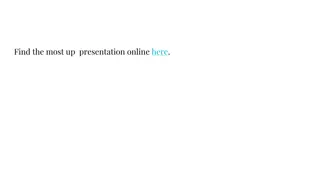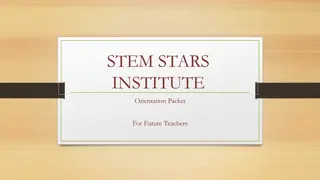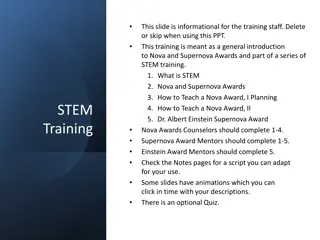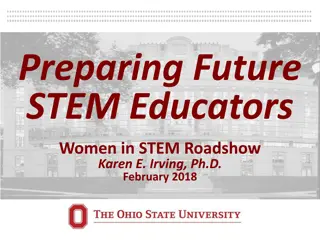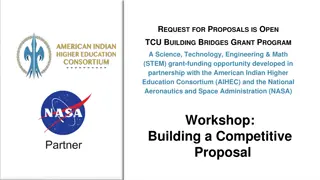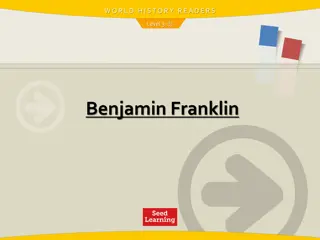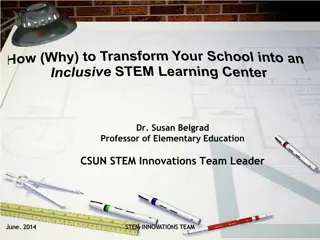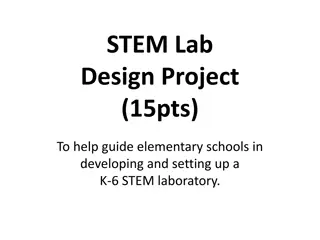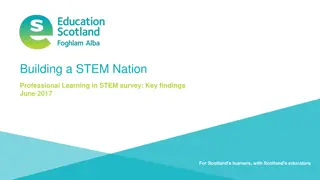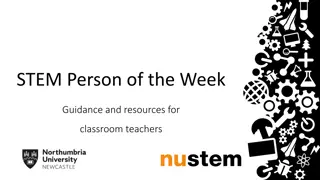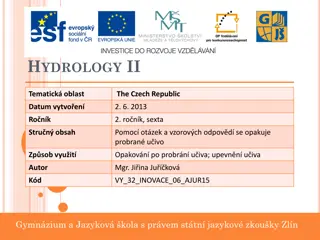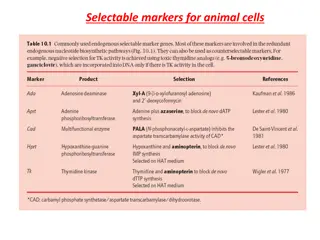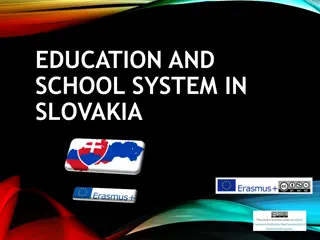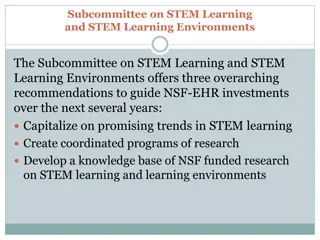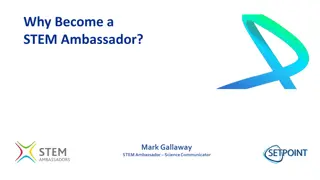Enhancing Science Education with STEM Lab at Franklin Lakes Public Schools
Engage in STEM learning at Franklin Lakes Public Schools' STEM Lab, where students in grades 6-8 are empowered to become self-directed, problem-solving scientists through project-based experiences. The Science Department aims to foster a love for inquiry and discovery, while the STEM Lab extends this mission by integrating engineering and 21st-century skills into the curriculum. Professional development opportunities inform the curriculum design process, ensuring a dynamic learning environment that evolves with advancements in science and technology.
Download Presentation

Please find below an Image/Link to download the presentation.
The content on the website is provided AS IS for your information and personal use only. It may not be sold, licensed, or shared on other websites without obtaining consent from the author.If you encounter any issues during the download, it is possible that the publisher has removed the file from their server.
You are allowed to download the files provided on this website for personal or commercial use, subject to the condition that they are used lawfully. All files are the property of their respective owners.
The content on the website is provided AS IS for your information and personal use only. It may not be sold, licensed, or shared on other websites without obtaining consent from the author.
E N D
Presentation Transcript
STEM Lab Franklin Lakes Public Schools Grades 6-8
Mission Science Department Mission: The Franklin Avenue Middle School Science department strives to create self-directed, enthusiastic, life-long learners. The science team wants to create scientists that have a desire to solve problems, question ideas, and actively engage in scientific inquiry. STEM Lab Mission: As an extension of the science department mission, the STEM Lab will provide Franklin Avenue Middle School students with opportunities to apply engineering and 21st century concepts and skills through collaborative, project-based learning experiences to enrich and extend the content of their core science courses. These experiences evolve in real time along with research and discoveries in the Sciences.
Curricular Design and Standards 21st Century Skills and Engineering and Science Practices: Collaboration, Creativity, Problem-Solving, Critical Thinking, Brainstorming MATH CONTENT TECHNOLOGY CONTENT SCIENCE CONTENT
Process to Inform Curriculum Design Professional development, collaboration, and leadership: College of New Jersey s How to Create a Middle School STEM Course Penn State University s: Center for Science and the Schools Grant to Eileen Antonison: BBEP: NewBio Teacher Workshop New Jersey Astronomy Center for Education Next Generation Science Standards Common Core State Standards and more!
The STEM Curriculum Created to supplement science content area learning through hands on projects Projects included may change as technology advances Science Curriculum in revision will also incorporate STEM
How do we Introduce STEM Topics? Project Based Learning Interdisciplinary Approaches o Incorporate Engineering Design o Technical Reading and Writing Learning by Inquiry Promote Innovation
Processes Franklin Lakes Science teachers developed this engineering design process. The process will be applied in all STEM content areas to organize thinking about engineering design and the scientific method, and to facilitate project completion.
STEM Lab-After! STEM Library Computer Programming Station The new STEM lab has trapezoid-shaped whiteboard tables that can be reconfigured daily and lab tables on wheels for additional classroom change and organization!
STEM Stations The Lego Wall was created to inspire creativity and fun! Students also use it to practice their 3D isometric drawing skills! STEM Library Computer Programming Station
Grade 6: Science-STEM 6th Grade Science 6th Grade STEM Key Concepts Introduced in 6th Grade Science include: Key Concepts Introduced in 6th Grade STEM include: Exploration of the environment in space and astronomy Earth s Rotation Tides Exploration of the Moon Focus on Engineering in Space Possible project topics: mars rover, satellite technology, space exploration, space station, rocketry Possible introduction to coding through exploration of these topics. Exploration of the Scientific Method Introduction to design process, design challenges, and areas of technology Introduction to Claims/Evidence and Reasoning
Grade 6 Sample Activity Space Design Students learned about space exploration by building and redesigning Mars Rovers Students learned about future missions to Mars and designed projects to meet the needs of people who might travel to and live there
Grade 7: Science-STEM 7th Grade Science 7th Grade STEM Key Concepts Introduced in 7th Grade Science include: Key Concepts Introduced in 7th Grade STEM include: Advanced Understanding of topics in biology Focus on areas of Biotechnology and Bioengineering in medical and agricultural fields Exploration of systems of living things Cells: structure and function Cell Processes: Photosynthesis Adaptations and ecology Possible project ideas: Designing a photobioreactor or hydroponic system Bioproducts or biomimicry 'Repairing a femoral artery' design (coding with possible application to the arduino board, possible robotics in medical tech applications)
Grade 7 Sample Activity Hydroponics Design Challenge Students learned about gardening with hydroponics and grew basil from seeds as a class. With their groups, they designed and tested hydroponic chambers that could support one plant each.
Grade 8: Science-STEM 8th Grade Science 8th Grade STEM Key Concepts Introduced in 8th Grade Science include: Key Concepts Introduced in 8th Grade STEM include: Introduction to Energy, Machines and Motion. Focus on engineering and physical science (electrical, structural, mechanical...) Extensive exploration of energy and motion through exploration of: Simple Machines Law of Conservation of Energy Hooke s and Newton s Laws Mechanical Advantage Projects can include: Creating Electrical circuits (applying coding to circuits with the makeymakey) LED Light design challenge Rube Goldberg Energy Transfer Challenge Transportation (solar cars, maglev, etc)
Grade 8 Sample Activity Rube Goldberg Devices
How do we assess learning? Design Process Rubrics Completion of Portfolios Claims, Evidence, Reasoning Scientific Journaling Technical Drawings Self-evaluation and group assessments Student Reflections Blog/digital journals
Thank You! With Special Thanks to our STEM Lab Teacher/ Curriculum Writer, Ms. Eileen Antonison
